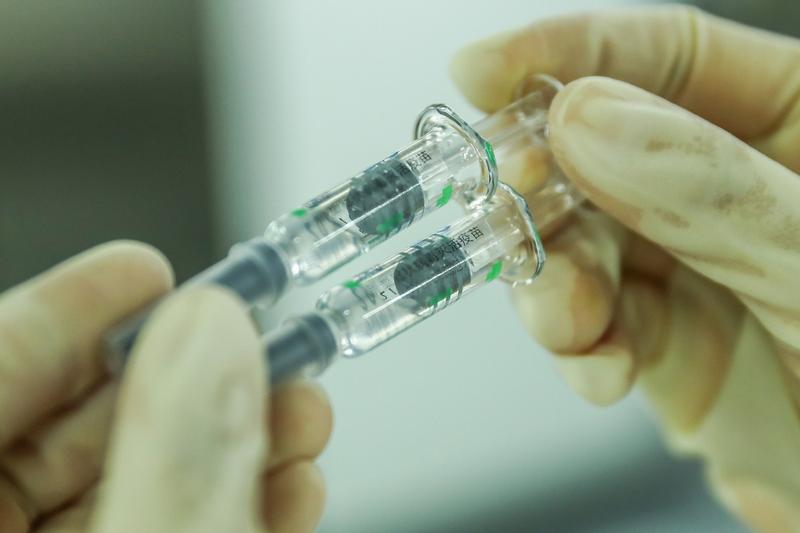 A staff member checks the packages of the COVID-19 inactivated vaccine at Sinovac Biotech Ltd, in Beijing, Dec 25, 2020. (PHOTO / XINHUA)
A staff member checks the packages of the COVID-19 inactivated vaccine at Sinovac Biotech Ltd, in Beijing, Dec 25, 2020. (PHOTO / XINHUA)
Malaysia launched its national vaccination program on Feb 24, giving a much needed shot in the arm to the country’s ongoing battle against COVID-19.
Three days after the first shipment of the Pfizer-BioNTech COVID-19 vaccine arrived in the capital city of Kuala Lumpur, the Malaysian government started rolling out its three-phase immunization program.
Prime Minister Muhyiddin Yassin launched the country’s inoculation program by getting the first dose of the vaccine at the local health office. It was televised live by the public broadcaster Radio Televisyen Malaysia.
More than 500,000 frontliners are expected to get vaccinated during the first phase which will last until April.
Analysts note how this program can change the course of Malaysia’s campaign against the pandemic and revive an economy that shrank 5.6 per cent — its worst performance since the 1998 Asian Financial Crisis.
Leow Chiuan Yee, senior lecturer at the Institute for Research in Molecular Medicine in Universiti Sains Malaysia (USM), said that public health data have shown how a national immunization campaign has led to a drop in hospital admission and reduced the risk of contracting a serious illness.
Citing research conducted by the University of Edinburgh, the University of Strathclyde and Public Health Scotland, Leow said that the risk of hospitalization fell about 84 percent 28 days following the national COVID-19 immunization in the United Kingdom.
“In the UK, viral infections were reported to have dropped by two-thirds since the beginning of lockdown, especially in London, there was an 80 percent drop in infection rates following COVID-19 vaccination,” he said, noting the data have shown the effectiveness of current COVID-19 vaccines against the viral infection.
“The hope is for the vaccine to improve (the economic) condition (of Malaysians),” said Serina Abdul Rahman, visiting fellow at the ISEAS-Yusof Ishak Institute in Singapore.
Serina said the program might also lead to the issuance of vaccine passports, prompting borders to reopen and allow more economic sectors to recover. But she cautioned a vaccine is “not a magic pill” that will solve all the problems the pandemic has wrought.
“The vaccine is not failsafe and there is the possibility of rising numbers of infections even if (more people) are getting vaccinated,” Serina said.
Malaysia has 285,761 confirmed cases as of Feb 23, according to the World Health Organization. This is the third highest number in the Southeast Asian region. In January, Muhyiddin enforced another round of lockdown measures and put the whole country under a state of emergency until Aug 1 to curb the rapid spread of the novel coronavirus.
Malaysia allocated 2.05 billion ringgit (US$510 million) for vaccine purchases, including those from China, and aims to vaccinate at least 80 percent of its more than 30 million people, with the goal of achieving herd immunity by 2022. The vaccination program will run in three phases.
The first, which started on Feb 24 and will last until April, will inoculate frontline personnel including employees of the Ministry of Health, Armed Forces, police, Civil Defense Force and the Malaysian Volunteer Department.
The second phase is scheduled from April to August for senior citizens aged 60 and above and vulnerable groups with morbidity issues, as well as persons with disabilities. The third phase is to be conducted from May to February 2022 for those aged 18 and above.
But analysts said that compared with other countries like China and Singapore, Malaysia’s vaccine rollout was slow. The London-based research and consultancy group Capital Economics said that the slow vaccine rollout means that movement restrictions “will need to remain in place for longer, holding back the economic recovery”.
Fitch Solutions said the lockdown measures combined with slow vaccine rollout “would further dent growth prospects in 2021, affecting especially private consumption”.
Oh Ei Sun, senior fellow with the Singapore Institute of International Affairs, said the country’s economy has to be reopened to sustain livelihood and encourage consumption. But he also acknowledged that with the country fighting a pandemic, the government has to “balance between life and livelihood”.
Leow of USM hopes that the completion of the national COVID-19 immunization program can help in reviving the national economy. But he said health protocols need to be maintained including wearing masks, hand-washing, and social distancing.
He said following these protocols are “still critically required until this global pandemic is completely controlled and resolved”.
“This is because there is still lack of scientific data to show that vaccinated people can’t carry and transmit the virus to other people. For safety reason, the COVID-19 SOP is still a must until the viral infection is successfully contained,” Leow said.


